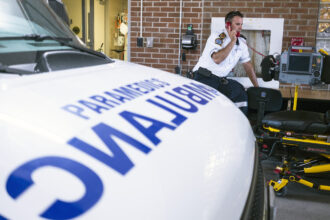A solitary figure clad in a blue running suit crests the horizon on Highway 2 near Lacombe, Alberta. To passing motorists, it might appear to be just another dedicated runner, but Jackson Clarke is on a mission far greater than personal fitness. As the centerpiece of the Cross Canada Mental Health Run 2025, Clarke has already covered over 4,000 kilometers in his coast-to-coast journey to raise awareness for mental health support services.
“Every step represents someone struggling in silence,” Clarke told me during our brief interview as he prepared for his scheduled stop in Lacombe this Friday. “I’ve lost friends to suicide. I’ve battled depression myself. This run isn’t just about raising money—it’s about showing people they’re not alone.”
Clarke began his monumental journey on April 15th in Victoria, British Columbia, and plans to finish in St. John’s, Newfoundland by late September—covering approximately 7,600 kilometers in total. The initiative has already raised $675,000 for the Canadian Mental Health Association, surpassing the halfway mark of his $1 million goal.
Lacombe residents are preparing a warm welcome for the 34-year-old runner. Mayor Sarah Johannson has announced a community reception at Lest We Forget Park, where Clarke will speak briefly about his experiences and the importance of mental health resources in rural communities.
“The pandemic exposed critical gaps in our mental health infrastructure,” noted Dr. Veena Sharma, Director of Mental Health Services for Central Alberta. “Clarke’s run is bringing vital attention to the fact that nearly 40% of Canadians who experienced declining mental health during COVID-19 reported difficulty accessing support services, with that number rising to 58% in rural areas.”
Local businesses have joined the effort, with fifteen Lacombe establishments pledging to match donations made during Clarke’s visit. The Lacombe Community Centre will host a mental health resource fair alongside the reception, providing information on available services for residents.
“We often think of physical health when we discuss wellness, but mental health deserves equal attention and resources,” Clarke emphasized. “Running across Canada is physically demanding, but it pales in comparison to the daily struggle many face with depression, anxiety, or other mental health conditions.”
The Cross Canada Mental Health Run has garnered significant national attention, with federal Health Minister Patricia Goodwin acknowledging the initiative in Parliament last month. The government recently announced a $45 million investment in rural mental health services, citing grassroots awareness campaigns like Clarke’s as catalysts for policy change.
Clarke’s support team, consisting of two vans and five rotating volunteers, ensures he maintains proper nutrition and recovery protocols throughout the journey. He averages 50 kilometers daily—slightly more than a marathon—and takes one rest day per week.
“The physical toll is considerable,” explained Dr. Marcus Reynolds, sports medicine specialist and volunteer physician with the run. “We’re monitoring for stress fractures, inflammation issues, and ensuring proper caloric intake. Jackson is burning approximately 5,000 calories daily just from running.”
For Lacombe resident Jennifer Paulson, the run holds special significance. After losing her teenage son to suicide in 2022, she founded the local support group “Healing Hearts” for bereaved families.
“When someone like Jackson brings national attention to mental health, it helps reduce stigma,” Paulson said. “People need to understand that seeking help isn’t weakness—it’s strength. If my son had felt comfortable reaching out, he might still be here today.”
After his Lacombe visit, Clarke will continue eastward through Saskatchewan, with scheduled stops in major centers and rural communities alike. His progress can be followed on the run’s website and social media channels, where daily updates include geographic milestones and personal reflections.
As mental health continues to emerge as a critical public health priority in Canada, Clarke’s journey serves as both inspiration and challenge. When asked what Canadians can do to support the cause beyond donations, his answer was simple: “Check on your people. Have real conversations. And when someone trusts you enough to share their struggles, listen without judgment.”
As Clarke prepares to depart Lacombe this weekend, one question remains for communities across Canada: How will we transform this moment of awareness into lasting change for those struggling with mental health challenges?


















